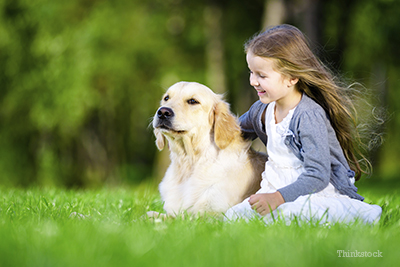
Scientists are beginning to realize that having a dog is good for you. Studies by theAmerican Heart Association, Europe PMC and PubMed.gov have shown that having a dog improves blood pressure, lowers cholesterol and helps with depression, anxiety and autism. Researchers have also found that children who grow up in a household with dogs have a lower risk of developing asthma and allergies1. Scientists believe that growing up with a dog exposes a child’s immune system to different antigens (an antigen is any foreign substance that evokes an immune response) and helps desensitize their developing immune system so it doesn’t overreact to harmless environmental antigens, like pollen or grass. Click here to learn more about pets helping with allergies and asthma.
In other words, growing-up around a dog “trains” your immune system so it doesn’t “overreact” to normal environmental antigens. This “overreaction” to normal antigens is the basis for allergies. However, there is evidence that the allergy benefits of having a dog are mediated by exposure to a dog’s microbiome.
What’s a microbiome?
The microbiome refers to the community of microorganisms that coexist in people, animals and plants. Most people are familiar with the use of probiotics to help promote a healthy gut microbiome. “Probiotics” are live cultures of “good” microorganisms, such as Lactobacillus and Bifidobacterium. Interestingly, living with a dog seems to result in a sharing of microbiomes. A study by elifesciences.org reported that families with dogs share as much of their microbiome with their dogs as they do with each other2.
The study of dog germs
This growing body of evidence has prompted researchers from the University of Arizona to design a study to determine if it’s the sharing of a dog’s microbiome that leads to some of the reported health benefits. Led by Dr. Charles Raison3, the study will enroll participants older than 50 years who have not taken antibiotics or lived with dogs for the last 6 months. Lizzie Parry of dailymail.com reports, the participants will choose a dog from the Humane Society of Southern Arizona and live with their dog for 3 months. Researchers will assess the gut microbiome of the participants and their dogs, their diet, level of activity and immune system function at baseline. They will then reassess at the end of month one, two and three. Changes in the mental well-being of the participants and their dogs will also be assessed. These researchers hope to determine if changes in the microbiome of dog owners correlate with improved immune system function and mental health. If their hypothesis proves to be true, your doctor may prescribe a big, sloppy dog kiss rather than an apple a day.
If you have any questions or concerns, you should always visit or call your veterinarian -- they are your best resource to ensure the health and well-being of your pets.
Resources:
